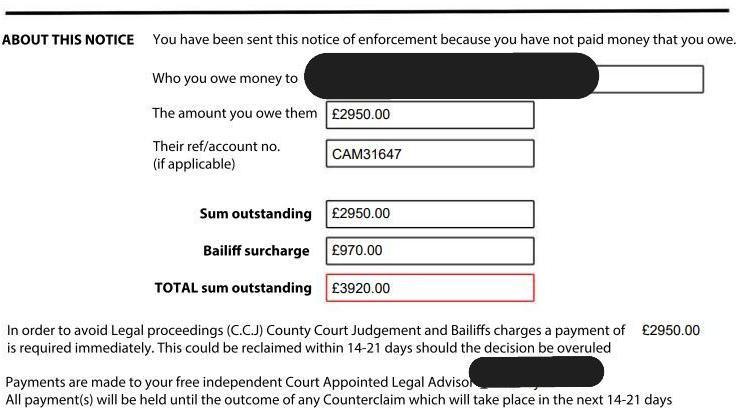'Fake bailiffs said they'd take my furniture'

Paul was told bailiffs were chasing an advertising debt
- Published
A man has described how criminals pretending to be bailiffs almost tricked him into paying thousands of pounds to settle a fictitious debt as part of an elaborate scam.
In what has been reported as a growing problem, people are phoned up and told bailiffs are on the way to their home to remove their possessions and that the only way to call them off is to settle the debt with a local court.
A convincing fake of the court's phone service then tries to take payment with the criminals hoping the panic of the approaching bailiffs will persuade them to part with their cash.
Paul, from Northumberland, told BBC Radio 4's You and Yours it started with a phone call out of the blue.
'Astonished and terrified'
"I answered the call and he then proceeded to say he was a bailiff and he was ringing because there'd been a county court judgment against me the previous summer in Worcester Crown Court and I owed £2,950 plus his fee of £970," he said.
He was then told: "'The boys and I are going to come round later today to collect furniture from your house to the value of the finding.'"
The man on the phone told Paul, who rents out holiday cottages on his farm, the debt related to unpaid social media marketing fees.
"I was astonished and terrified, actually, at the same time," he said.
The man gave Paul a number to contact the court for details.
Although the number was bogus, Paul encountered the court's genuine automated switchboard message - which the criminals had duplicated to make the scam more convincing.
When he was put through to someone, Paul was told he had unpaid "marketing expenses".
He then received what looked like genuine court documents by email - which have been shared with the BBC - detailing the debts that had apparently built up.

Paul was emailed what was claimed to be official court documents
Paul was asked to transfer the money to the personal bank account of a "court appointed adviser" who was working as a freelancer.
"At this point, alarm bells were ringing loud and clear," he said.
Paul then searched online for the correct contact number for the court, and realised the one he had been given was wrong, just as another email asking for payment arrived, from an unlikely-looking dot com email address.
"All the way through all of this, I keep having phone calls from the alleged bailiff wanting me to tell him that I had sent the money," he said.
"He said not until the money has been sent will he call off the action of the guys with the fists who would come around and steal all my furniture."
'Panic mode'
Victoria, who lives in Cheshire, was also targeted with the scam.
When her phone rang, she was told the "enforcement officers" were 40 minutes away and were coming to remove items from her home.
"I kind of went into panic mode," she said.
The man told her he couldn't discuss details over the phone, but would give her the details of Chester County Court who she could call for an explanation.
"I was on the phone for ages," said Victoria.
"I couldn't get through. So because I couldn't get through and the bailiff was on the way, I was panicking even more."
She said she was able to get through to another man, also a scammer, who told her she had built up debt through Google advertising - and because she remembered speaking to Google several years ago, this seemed plausible.
Victoria, who works for a funeral business, had never actually bought Google advertising, but the man told her she had used a free trial and failed to cancel it.
Council sorry over bailiff 'mix-up' debt threat
- Published18 November 2024
'I was scammed out of £75k by Martin Lewis deepfake advert'
- Published24 November 2024
Fraudsters use late broadcaster's profile in scam
- Published7 September 2024
Victoria was told she should have appeared in court and that there was a warrant out for her arrest.
"I just wanted to send the money over there and then," she said.
"As I was on my computer setting it up another bailiff rang me and he was on his way and he was the nasty bailiff, he was the horrible bailiff.
"He was just saying that he was now 10 minutes away and he was coming to clear the property and to get the bank transfer done as soon as possible."
As she set up the payment on her online banking, her husband had searched online for the correct number for the court and called it - but was number 30 in the queue.
"He was walking out the room saying he would never speak to me again if I sent the money," she said.
"And I just wanted to stop the bailiffs."
A warning on Victoria's online bank that the details she'd been given were for a personal - not a business - account sowed the first seeds of doubt in her mind - just as her husband got through to the genuine court who told them not to pay.
'Tip of the iceberg'
It was a near miss for both Paul and Victoria.
"They sort of almost had me," said Paul.
"You go into a mode of shock where you're not really thinking terribly clearly.
"And also there was sufficient plausibility in some of it because they claimed that I'd failed to pay marketing expenses for the holiday cottage business that I do actually run. And they'd rung me on my mobile number and they knew my name.
"There were a few question marks where it felt as though it could have been real - sufficient to make me terrified..."
The Ministry of Justice said it was a criminal offence to impersonate a bailiff, and that anyone receiving a similar call should hang up and find the correct number for the court.
Sarah Naylor, from the trade body for bailiffs, the Civil Enforcement Association, said there had been an increase in the number of reports her organisation received about these tactics, and that these were likely to be the tip of the iceberg as few victims would think to notify genuine bailiffs after being scammed.
"These scam companies work on the basis of urgency and fear," she said.
Genuine enforcement officers will always reschedule and allow people time to check details, she said, and would never only offer one payment option.
"Take a breath and reflect," she advised anyone receiving a similar call.
"Does this seem right? Is this the first you've heard about it? Does it seem suspicious? Keep calm and understand more about the debt and if that individual isn't helping you with that, then it's very likely that they're not a legitimate enforcement agent."
Fake Bailiffs, Heat Pump Tourism and Supermarket Loyalty Cards